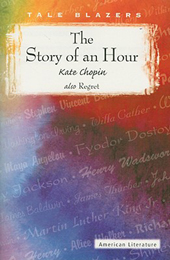Empathy

A few weeks ago, my students met to discuss stories by Denis Johnson and Aimee Bender. Most of the class didn't like these stories at all. Bender's protagonist was a bad woman, seducing men at a party, then discarding them. And if they disliked Bender's protagonist, they outright hated Johnson's characters. "These are bad people," my students said. "They do drugs. They're hurting themselves. I don't like them, and I can't care about them."
I remember reacting in a similar way when I was a freshman in college. It was the first time I read Kate Chopin's "The Storm." In the story, a married woman has an affair while her husband is waiting out a storm. I felt like the story celebrated an immoral person and that we shouldn't be reading it. I was bothered that anyone could like it. She did awful things and wasn't punished. It was unacceptable. But as I came to realize, there was nothing wrong with the Chopin story. The fault was with me.

What my students were doing, and what I once did, was criticizing fiction for not giving good role models or teaching correct behavior. This is the same spirit that would ban the Brothers Grimm for being too violent, denying children the richness of fairy tales because they "aren't appropriate." It's the same spirit that makes politicians and parents want complicated, thoughtful books pulled from school libraries because they might lead students to challenge authority. This spirit misses the point of art.
The greatest thing stories can do is to teach us empathy. This is fiction's cardinal virtue. But our empathy is bankrupt if we can only feel it for people who live like us, who think like us, who look like us. Condemning people for being different and writing off their experiences, refusing to participate in their stories, is an act of cruelty.
Once, I was in a classroom and someone brought up Denis Johnson's Jesus' Son. The professor told us that the book made him feel gross. Reading about those kinds of people, the kind who would rip electrical wiring out of walls to sell the copper. It made him feel dirty.
Those people were a lot closer than he realized. Before my uncle died, the last time I saw him was outside the white camper where he lived. When my father and I drove up, my uncle was stirring a bonfire of electrical wiring, burning the insulation off so he could sell the copper. I helped him stir the fire while he talked to my father. My professor had no idea that the people of Johnson's story might be sitting in his class. He didn't understand that he was being cruel.
As people, it's good to cultivate empathy in ourselves, but as readers and writers it's mandatory. We shouldn't cut ourselves off from stories that don't match our worldview. Consider Flannery O'Connor, an author who wrote about the most hateful and bigoted people, but she never lets us forget that these characters are suffering. She makes us empathize with their pain, even as we recoil from who they are. We don't need fiction to tell us what's right and wrong. We know that already. What we need—the lesson we can never learn enough—is to value the stories of those who are different from us.



